Fatigue mitigation with SleepTrackTXT2 in air medical emergency care systems: study protocol for a randomized controlled trial
- PMID: 28583143
- PMCID: PMC5460424
- DOI: 10.1186/s13063-017-1999-z
Fatigue mitigation with SleepTrackTXT2 in air medical emergency care systems: study protocol for a randomized controlled trial
Abstract
Background: Most air medical Emergency Medical Services (EMS) clinicians work extended duration shifts, and more than 50% report inadequate sleep, poor sleep quality, and/or poor recovery between shifts. The SleepTrackTXT pilot trial (ClinicalTrials.gov, NCT02063737) showed that use of mobile phone text messages could impact EMS clinician self-reported fatigue and sleepiness during long duration shifts. The purpose of the SleepTrackTXT2 trial is to leverage lessons learned from the first SleepTrackTXT study and test an enhanced intervention targeting air medical EMS clinicians.
Methods/design: We will conduct a multi-site randomized trial with a sample of adult EMS clinicians recruited from four air medical EMS systems located in the midwest, northeastern, and southern USA. Participants will be allocated to one of two possible arms for a 4-month (120-day) study period. The intervention arm will involve text-message assessments of sleepiness, fatigue, and difficulty concentrating at the beginning, every 4 hours during, and at the end of scheduled shifts. Participants reporting high levels of sleepiness, fatigue, or difficulty with concentration will receive one of nine randomly selected intervention messages to promote behavior change during shift work to improve alertness. Intervention participants will receive a text-message report on Friday of each week that shows their sleep debt over the previous 7 days followed by a text message to promote paying back sleep debt recovery when feasible. Participants in the control group receive text messages that only include assessments. Both arms will receive text-message assessments of perceived recovery since last shift, sleepiness, fatigue, or difficulty with concentration at noon (1200 hours) on days between scheduled shifts (off-duty days). We have two aims for this study: (1) to determine the short-term impact of the enhanced SleepTrackTXT2 intervention on air medical clinician fatigue reported in real time during and at the end of shift work, and (2) to determine the long-term impact of the SleepTrackTXT2 intervention on sleep quality and sleep health indicators including hours of sleep and recovery between shift work.
Discussion: The SleepTrackTXT2 trial may provide evidence of real-world effectiveness that would support widespread expansion of fatigue mitigation interventions in emergency care clinician shift workers. The trial may specifically support use of real-time assessments and interventions delivered via mobile technology such as text messaging.
Trial registration: ClinicalTrials.gov, NCT02783027 . Registered on 23 May 2016.
Keywords: Alertness; Emergency medicine; Fatigue; Randomized controlled trial; Shiftwork; Sleepiness.
Figures
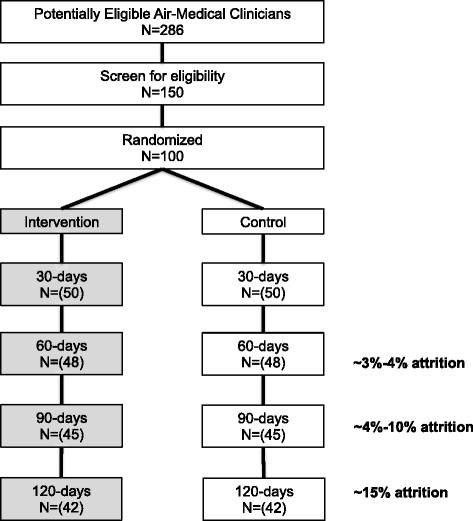
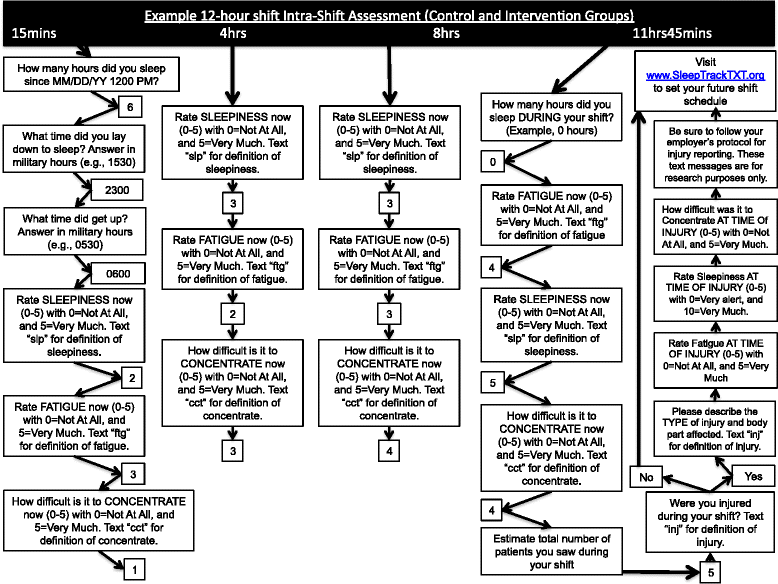
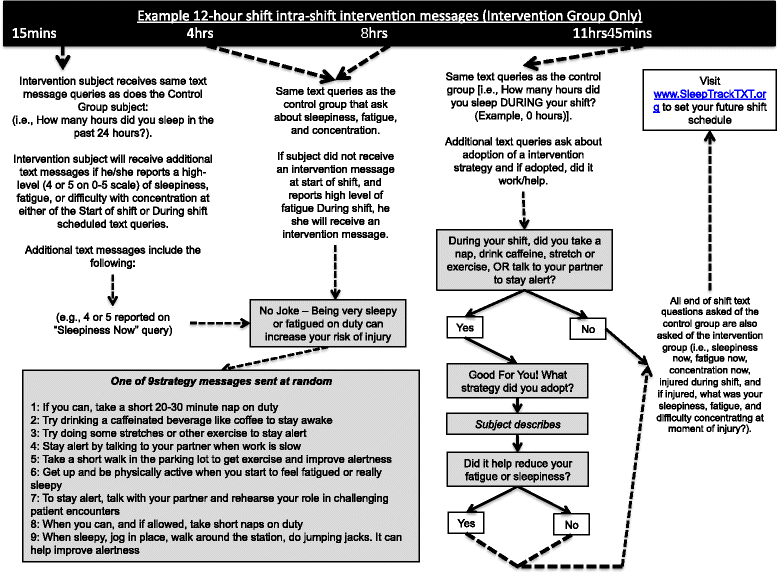
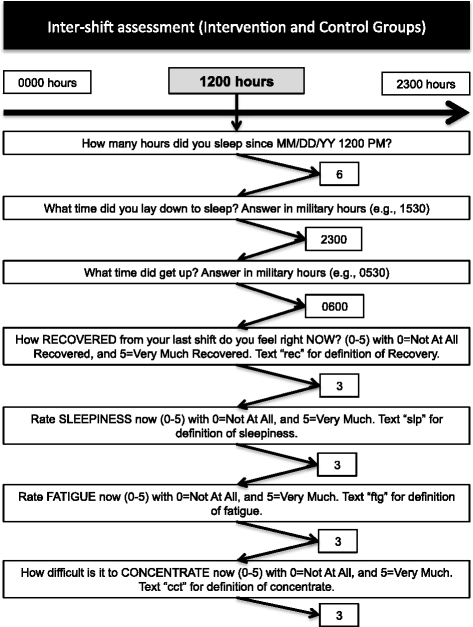
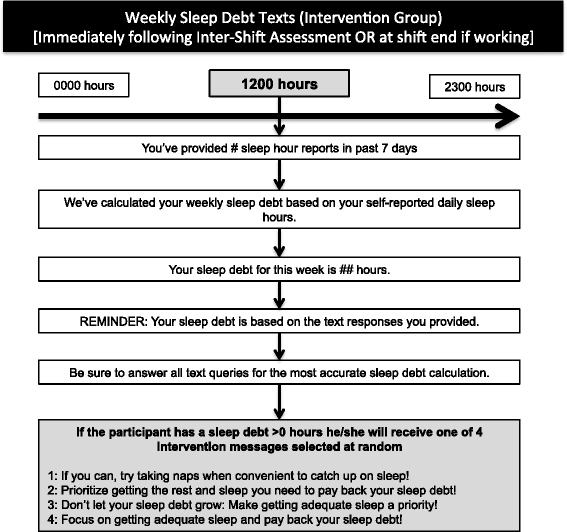
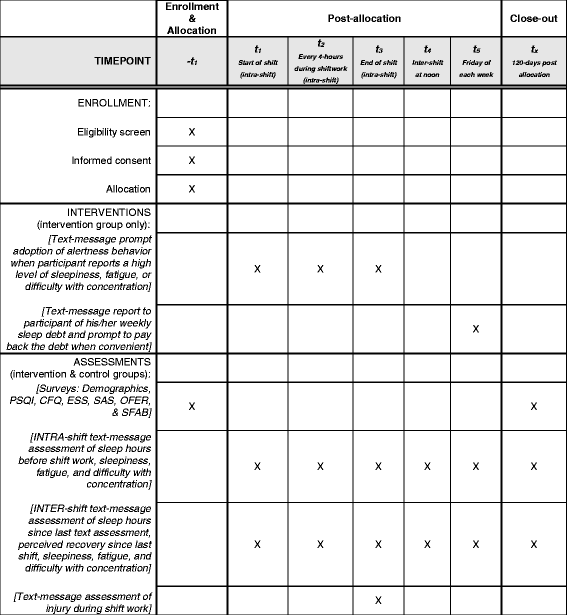
Similar articles
-
Mobile phone text messaging intervention to improve alertness and reduce sleepiness and fatigue during shiftwork among emergency medicine clinicians: study protocol for the SleepTrackTXT pilot randomized controlled trial.Trials. 2014 Jun 21;15:244. doi: 10.1186/1745-6215-15-244. Trials. 2014. PMID: 24952387 Free PMC article. Clinical Trial.
-
Real-Time Fatigue Mitigation with Air-Medical Personnel: The SleepTrackTXT2 Randomized Trial.Prehosp Emerg Care. 2019 Jul-Aug;23(4):465-478. doi: 10.1080/10903127.2018.1532476. Epub 2018 Oct 29. Prehosp Emerg Care. 2019. PMID: 30285519 Clinical Trial.
-
Real-time fatigue reduction in emergency care clinicians: The SleepTrackTXT randomized trial.Am J Ind Med. 2015 Oct;58(10):1098-113. doi: 10.1002/ajim.22503. Epub 2015 Aug 25. Am J Ind Med. 2015. PMID: 26305869 Free PMC article. Clinical Trial.
-
Effects of Napping During Shift Work on Sleepiness and Performance in Emergency Medical Services Personnel and Similar Shift Workers: A Systematic Review and Meta-Analysis.Prehosp Emerg Care. 2018 Feb 15;22(sup1):47-57. doi: 10.1080/10903127.2017.1376136. Epub 2018 Jan 11. Prehosp Emerg Care. 2018. PMID: 29324083
-
Shorter Versus Longer Shift Durations to Mitigate Fatigue and Fatigue-Related Risks in Emergency Medical Services Personnel and Related Shift Workers: A Systematic Review.Prehosp Emerg Care. 2018 Feb 15;22(sup1):28-36. doi: 10.1080/10903127.2017.1376135. Epub 2018 Jan 11. Prehosp Emerg Care. 2018. PMID: 29324079
Cited by
-
Medical shift work: a narrative review.Rev Bras Med Trab. 2023 Aug 8;21(2):e2021881. doi: 10.47626/1679-4435-2021-881. eCollection 2023 Apr-Jun. Rev Bras Med Trab. 2023. PMID: 38313097 Free PMC article. Review.
-
Variations in Sleep, Fatigue, and Difficulty with Concentration Among Emergency Medical Services Clinicians During Shifts of Different Durations.Int J Environ Res Public Health. 2025 Apr 6;22(4):573. doi: 10.3390/ijerph22040573. Int J Environ Res Public Health. 2025. PMID: 40283798 Free PMC article. Clinical Trial.
-
Napping on the night shift and its impact on blood pressure and heart rate variability among emergency medical services workers: study protocol for a randomized crossover trial.Trials. 2021 Mar 16;22(1):212. doi: 10.1186/s13063-021-05161-4. Trials. 2021. PMID: 33726840 Free PMC article.
References
-
- Rogers AE. Chapter 40: The effects of fatigue and sleepiness on nurse performance and patient safety. In: Hughes RG, editor. Patient safety and quality: an evidence-based handbook for nurses. Rockville: Agency for Healthcare Research and Quality; 2008. - PubMed
Publication types
MeSH terms
Associated data
LinkOut - more resources
Full Text Sources
Other Literature Sources
Medical

